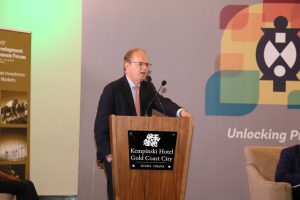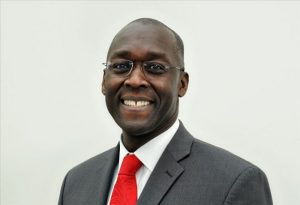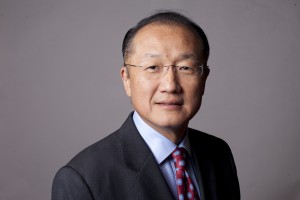 A whopping US$2.029 billion, approved by the World Bank for 22 projects in Ghana, is reportedly locked at the various Ministries, Departments, and Agencies (MDAs) in the country.
A whopping US$2.029 billion, approved by the World Bank for 22 projects in Ghana, is reportedly locked at the various Ministries, Departments, and Agencies (MDAs) in the country.
This is due to the disappointing process of disbursement, attributed to the general weaknesses in the country’s implementation process.
According to the latest World Bank’s status implementation report on its supported projects in Ghana, the majority of the projects currently underway would be delayed due to implementation deficiencies.
The report revealed that only $25.02 million out of the $100 million meant for the Ghana Commercial Agricultural Project (GCAP) has been utilised since the commencement of the project in April 2013.
The all-important project being implemented by the Ministry of Food and Agriculture (MoFA), and its agency, the Ghana Irrigation Development Authority (GIDA), Lands Commission, and Private Enterprise Federation (PEF), are yet to spend the over $85 million on the project, which ends in 2017.
To this end, the World Bank did not hesitate to rate the progress and overall implementation of multimillion dollar project, which is meant to strengthen investment promotion infrastructure, facilitate secure access to land and project management, securing Public Private Partnerships (PPPs) and small-holder linkages in the Accra Plains, and project management and monitoring and evaluation, as moderately unsatisfactory.
A senior official of the Africa Region Strategic Communications at World Bank Ghana office, Kennedy Fosu, who circulated the report, noted that the third Implementation Support Mission (ISM), which was carried out during June 23-July 11, 2014, identified a number of serious shortcomings in both the original project design, and subsequent project implementation.
These shortcomings, he continued, “evolve mainly around the proposed investments in irrigation – which is a fundamental requirement in large-scale commercial agriculture development – and the matching grant scheme.
The Accra Plains irrigation PPP investment, as proposed in component two of the project, remains surrounded by many uncertainties, in particular, those related to land access and private investors’ interests.
The Public Private Partnerships (PPP), as envisaged in the original project document, does not seem achievable in the project’s remaining implementation period.
In addition, there were a number of serious shortcomings in the implementation of the first round of the matching grant scheme. These shortcomings relate to eligibility criteria, as advertised in the call for proposals, process followed in evaluating grant applications, and due diligence exercised for awarded proposals, according to the report.
The report stated: “Despite the fact that a number of these shortcomings resulted in part from the considerable time and disbursement pressure faced by the project, they need to be rectified immediately, and lessons need to be drawn from the experience gained for future matching grant rounds.
“GCAP needs to review the grants screening process and due diligence reports on the grantees, and rectify non-compliance with national and/or World Bank safeguards requirements found among a number grant awardees.”
The project development objective (PDO) of the GCAP, the World Bank said, was increased access to land, private sector finance, input and output markets by smallholder farms from private-public partnerships in commercial agriculture in the Accra Plains and Savannah Accelerated Development Authority (SADA) zone.
Another project the bank fumed at its snail’s pace implementation is the Ghana Sustainable Land and Water Management, which was approved on 30th November 2010, but will complete in 28th February 2018.
The $8.5 million project, being implemented by the Ministry of Environment Science and Technology, and its agency, the Environmental Protection Agency (EPA), Ministry of Food and Agriculture, Forestry Commission, with the overall objectives to demonstrate improved sustainable land and water management practices, and strengthen spatial planning for identification of linked watershed investments in the Northern Savannah region of Ghana, attracted moderately satisfactory progress and implementation ratings.
Furthermore, the report hinted that the $50.3 million Ghana-West Africa Regional Fisheries Programme has, so far, accessed $8 .2 million by the project’s executors, namely the Ministry of Fisheries and Aquaculture Development, and Fisheries Commission, while the chunk of the funds were being locked up at the International Development Association (IDA), the private sector arm of the World Bank.
The project is still significantly behind schedule. Since the effectiveness of the project in June 12, 2012, the project has been moving very slowly towards its goal.
So, the project, which is expected to complete in December 2017, recorded a moderately unsatisfactory rating in its progress towards achievement of the PDO.
The Project Development Objective, according to the bank, is to support the sustainable management of Ghana’s fish and aquatic resources by strengthening the country’s capacity to sustainably govern and manage the fisheries; reducing illegal fishing; increasing the value and profitability generated by the fish resources and the proportion of that value captured by the country; and developing aquaculture.
The Government of Ghana (GoG) and the World Bank have engaged in connection with the West Africa Regional Fisheries Programme to restore the economic benefits from fisheries.
Two of the seven goals of the GoG’s Fisheries and Aquaculture Sector Development Plan (FASDP) are to increase revenue and profitability in capture fisheries by, at least, $50 million per year within five years, and increase the aquaculture production to 100,000 tonnes per annum within five years.
The story is the same for the Ghana Skills and Technology Development Project being implemented by the Ministry of Education and its agency – Council for Technical and Vocational Education and Training (COTVET).
The report disclosed that only $30.64 million out of the $70 million for project has been utilised since the commencement of the project in 2011, while a large sum of the project is locked up at the World Bank.
The all-important project, which has components including Institutional Strengthening of Skills Development; Institutional Strengthening of Science and Technology Development; and Financing of Skills and Technology Development Programmes through the Skills Development Fund (SDF), also recorded moderately unsatisfactory.
The project objective is to improve demand-driven skills development, and increase adoption of new technologies in selected economic sectors, according to the report.
CONT’D ON 7
Additionally, the Ghana Natural Resources and Environmental Governance Technical Assistance being implemented by the Forestry Commission, Ministry of Environment Science and Technology, Ministry of Lands and Natural Resources, Minerals Commission, Environmental Protection Agency, was rated satisfactory by the bank.
The Project Development Objective of the proposed Technical Assistance operation is to improve institutional capacity of key ministries, departments and agencies in natural resource and environmental management.
The project became effective in March 2014, after a significant delay (nine months after Board approval). The first advance of US$1 million was disbursed into a Project Designated Account in June 2014.
The $156 million Ghana Secondary Education Improvement Project, which generated a brawl in Ghana’s Parliament in May this year, is yet to kick off.
The Project Development Objective is to increase access to senior secondary education in underserved districts, and improve quality in low-performing senior high schools in Ghana.
Another project -Maternal, Child Health and Nutrition Project ($ 68 million)- approved by the bank in May this year, is yet to be released to the implementing agencies -Ministry of Health, and Ghana Health Service. It is awaiting cabinet and parliamentary approval.
The project, with components such as Component Community-Based Maternal and Child Health and Nutrition Intervention, Component Institutional Strengthening Capacity Building, M&E, and Project Management, when implemented, would improve utilisation of community-based health and nutrition services by women of reproductive age, especially, pregnant women, and children under the age of two years.
The report noted: “The Ghana Maternal and Child Health and Nutrition Improvement Project was approved by the Board on May 20, 2014, and is expected to be effective by September 01, 2014, after cabinet and parliamentary approval, and signature of the financing agreement. Implementation will commence once the project is signed and effective.”
According to the report, the only project which utilised its finance well was the Ghana Social Opportunities Project being implemented by the Ministry of Gender, Children and Social Protection, and Ministry of Local Government and Rural Development.
Out of the $88.6 million, the implementing agency disbursed $70.12 million on the project, which has the development objectives of improving the targeting of social protection programmes and provide income support to poor households through the Livelihood Empowerment Against Poverty (LEAP) grants and LIPW infrastructure in targeted districts.
Building on the successes of this original project, additional financing (AF) was prepared and was approved by the World Bank Board of Directors on May 27, 2014. Under the AF, the project is being restructured to adopt a stronger focus on strengthening social protection systems and better achievement of results.
Therefore, the Project Development Objectives (PDO) has been revised, and the key project indicators simplified. Specifically, additional financing would support formulation of social protection policy; scaling up of the Labor Intensive Public Works (LIPW) and the Livelihood Empowerment Against Poverty (LEAP) programmes; designing and rolling out the Ghana National Household Registry (GNHR) for social protection programmes and strengthening social
African Eye News.com





